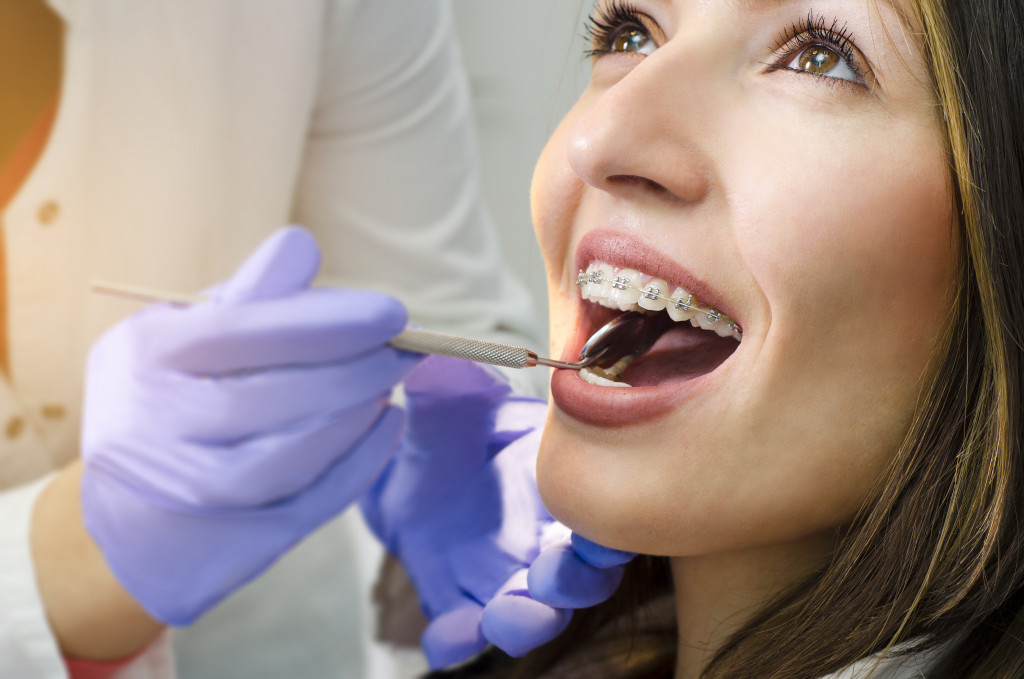- Check with your dentist regularly and follow their solutions for dental health.
- Brush your teeth twice a day for two minutes each time.
- Floss between your teeth daily so food particles don’t get stuck in between.
- Limit sugary food and drinks and brush or rinse afterward.
- Use alcohol-free mouthwash after brushing and flossing to remove bacteria.
Good dental hygiene is essential in maintaining overall health and well-being. Preventative measures to keep your mouth healthy can help avoid costly dental trips. To ensure that your teeth and gums remain healthy, following these five tips for proper dental care is important.
1. Check with Your Dentist Regularly
If you want to maintain good dental health, it is important to visit your dentist regularly. Not only will the dentist be able to examine and clean your teeth, but they can also advise you about specific ways to improve your dental hygiene. During your appointment, be sure to ask questions about any dental problems you are experiencing and ask what types of products the dentist recommends for treating or preventing these issues.
Here are some recommended solutions your dentist may suggest for your dental health:
Braces
Braces are an excellent option to straighten your teeth and improve your smile. When it comes to braces, durable gold brace brackets are a popular option for your teeth. These brackets help reduce staining and discoloration and cause less irritation than other materials. Gold brackets also make it easier for your dentist or orthodontist to adjust your bite, as they have greater stability than other types of braces material.
Fluoride Treatments
Fluoride is an important mineral that helps strengthen tooth enamel and protect teeth against decay. If you are prone to cavities, your dentist may recommend a fluoride treatment as part of your dental hygiene routine. A gel or foam containing a high fluoride concentration is applied to your teeth during a fluoride treatment. This helps prevent cavities and keeps your teeth strong and healthy.
Dental Sealants
Dental sealants are a thin plastic coating applied to the tooth’s surface. The purpose of this coating is to provide an additional layer of protection against cavities and other dental problems. This preventive measure can help protect the teeth from decay by creating a barrier between the tooth’s surface and bacteria.
Mouthguards
If you participate in contact sports or other physical contact activities, it is important to wear a mouthguard. A custom-fitted mouthguard can protect your teeth from chipping and breaking by absorbing the force of any blows to your face. Your dentist will be able to provide you with more information about when and why it is necessary to wear a mouthguard.
2. Brushing Your Teeth is a Must

When it comes to taking care of your teeth, one of the most important things that you can do is brush regularly. This means brushing at least twice a day for two minutes each time. Make sure to use a toothbrush with soft bristles and fluoride-based toothpaste when brushing your teeth. By brushing regularly, you can remove any food particles and plaque that can build up on your teeth and cause decay.
3. Flossing is Also Important
Brushing alone isn’t enough to keep your teeth in top condition. You also need to floss between your teeth every day at least once. This helps remove plaque or bacteria that has built up on your teeth and can help prevent gum disease. When you floss, be sure to use a gentle touch and move the floss up and down.
4. Sugary Food and Drinks Can Do More Harm Than Good
It’s no surprise that sugary foods and drinks can damage your teeth. Limiting the amount of sugar you consume daily is important, as too much sugar can cause tooth decay. If you indulge in something sweet, brush your teeth afterward or rinse your mouth with water. This will help remove any sugary residue that can lead to tooth decay.
5. Use a Mouth Rinse

An alcohol-free mouth rinse after brushing, and flossing is a great way to care for your dental health. Mouthwashes are designed to help get rid of bacteria and other germs that can cause pain and irritation in the mouth. Some mouthwashes even contain fluoride, which helps fight cavities and tooth decay. Be sure to follow the directions on the mouthwash label correctly, as it can be an effective part of your daily oral care routine.
In Closing
Caring for your dental health is essential to maintaining a healthy and beautiful smile. By following these five tips, you can ensure that your teeth remain in top condition and that your overall dental health is protected. If you have questions about how to best care for your teeth, speak with your dentist. They can provide you with tailored advice and recommendations on the best ways to keep your smile looking its best.
